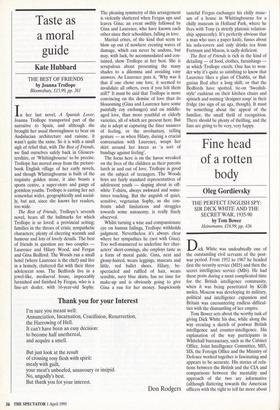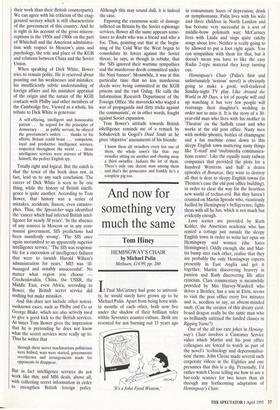Fine head of a rotten body
Oleg Gordievsky
THE PERFECT ENGLISH SPY: SIR DICK WHITE AND THE SECRET WAR, 1935-90 by Tom Bower Heinemann, £16.99, pp. 426 Dick White was undoubtedly one of the outstanding civil servants of the post- war period. From 1952 to 1967 he headed first the security service (MI5) and then the secret intelligence service (MI6). He had these posts during a most complicated time for the British intelligence community, when it was being penetrated by KGB moles, Moscow was developing its military, political and intelligence expansion and Britain was encountering endless difficul- ties with the dismantling of her empire.
Tom Bower sets about the worthy task of giving Dick White his due, while along the way creating a sketch of postwar British intelligence and counter-intelligence. His explanation of the way participants in Whitehall bureaucracy, such as the Cabinet Office, Joint Intelligence Committee, MI5, SIS, the Foreign Office and the Ministry of Defence worked together is fascinating and appears to be accurate. His stories of rela- tions between the British and the CIA and comparisons between the mentality and approach of the two are informative (although flattering towards the American officers with the right to tell far more about their work than their British counterparts). We can agree with his criticism of the exag- gerated secrecy which is still characteristic of the government of this country. And he is right in his account of the gross miscon- ceptions in the 1950s and 1960s on the part of Whitehall and the American administra- tion with respect to Moscow's aims and psychology, the role and place of the KGB and relations between China and the Soviet Union.
When speaking of Dick White, Bower tries to remain polite. He is reserved about pointing out his weaknesses and mistakes: his insufficiently subtle understanding of foreign affairs and his mistaken appraisal of the origin and the nature of the KGB contacts with Philby and other members of the Cambridge five. Viewed as a whole, his tribute to Dick White is generous:
A self-effacing, intelligent and honourable patriot . . . he argued for the principles of democracy . . . as public servant, he obeyed the government's orders . . . thanks to his efforts, Britain could boast . . . competent, loyal and productive intelligence services, respected throughout the world . . . those intelligence services were mirrors of White himself, the perfect English spy.
Totally right and logical. But the catch is that the tenor of the book does not, in fact, lead us to any such conclusion. The career of Dick White is seen to be one thing, while the history of British intelli- gence is quite another. According to Tom Bower, that history was a series of mistakes, accidents, fiascos, even catastro- phes. Thus, the Spycatcher saga identified the 'cancer which had infected British intel- ligence for nearly 30 years'. 'In the absence of any sources in Moscow or in any com- munist government, SIS predictions had been manifestly wrong'. 'The SIS once again succumbed to an apparently superior intelligence service.' The SIS was responsi- ble for a succession of intelligence failures that were to tarnish Harold Wilson:s administration for years.' MI5 was 'ill- managed and notably unsuccessful'. No matter what region you choose Czechoslovakia, China, the USSR, the Middle East, even Africa, according to Bower, the British secret service did nothing but make mistakes.
And this does not include other notori- ousknown cases, such as Philby and Co or George Blake, which are also actively used to give a good kick to the British services. At times Tom Bower gives the impression that he is pretending he does not know what the secret services were really up to. Thus he writes that
through these secret machinations politicians were bribed, wars were started, governments overthrown and arrangements made for opponents to disappear.
But in fact intelligence services do not work like this; and MI6 deals, above all, with collecting secret information in order to strengthen British foreign policy. Although this may sound dull, it is indeed the case.
Exposing the enormous scale of damage inflicted on Britain by the Soviet espionage services, Bower all the same appears some- times to doubt who was a friend and who a foe. Thus, pointing out that at the begin- ning of the Cold War the West began to consolidate its forces against the Soviet threat, he says, as though in rebuke, that the `SIS ignored their wartime sympathies ' and the murderous deeds committed under the Nazi banner'. Meanwhile, it was at this particular time that no less murderous deeds were being committed in the KGB prisons and the vast Gulag. He calls the Information Research Department of the Foreign Office 'the mavericks who waged a war of propaganda and dirty tricks against the communists', or in other words, fought against Soviet expansion.
Tom Bower's attitude towards British intelligence reminds me of a remark by Sobakevich in Gogol's Dead Souls as he gives 'objective' assessments of his friends:
I know them all: swindlers every last one of them, the whole town's like that: one swindler sitting on another and chasing away a third swindler. Judases the lot of them. There's only one decent man among them and that's the prosecutor and frankly he's a complete pig too.



























































 Previous page
Previous page